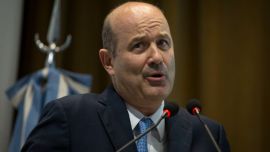The economy will be one of the main challenges facing Alberto Fernández’s incoming government.
Somewhere between the “ordered accounts” heralded by the outgoing Cambiemos coalition and the “scorched earth” lamented by the Peronists, the Frente de Todos leader will face a complex panorama: dollar-denominated debt (that, according to Fernández, is rooted in the risk of default), inflation and poverty are all higher than they were in 2015 when Macri took office. The deficit and the exchange rate needs to be kept competitive in order to grow, while carefully avoiding runs on the bank.
Here, the five major challenges Fernández will face – and need to address – early in his term.
DEBT
Fernández assumes office with more in terms of Central Bank reserves than Macri had when he took on the presidency But the incoming leader will also face a mountain of external debt, exacerbated by record US$57-billion loan from the International Monetary Fund (IMF), acquired last year. Some US$44 billion has been received to date by Buenos Aires.
The Peronist leader has appointed Martin Guzman as economic minister to help him navigate this complex situation, whose idea it seems is to restructure the payments prioritising private lenders first, who he’d pay back using interest and capital, and then pay the IMF back two years down the line. This proposal would theoretically avoid a default.
However, critics say a move like this would “permanently close” credit markets to Argentina due to the “uncertainty” surrounding liquidity and solvency.
“Macrismo bequeathed an elevated public debt in foreign currency and a curtailed capacity to pay. What’s worse, an important part of these must be paid off in the short term — US$21 billion in the first half of 2020,” read one recent report from the Ecolatina consultancy firm. “The renegotiation of payments will be one of the first actions that the economic team must achieve, as relevant as it is immediate.”
In a recent interview with Perfil, departing Finance Minister Hernán Lacunza said that Argentina's total debt equates to around 70 percent of gross domestic product, and not 100 percent of GDP as some private studies have estimates. The total debt, Lacunza says, is around US$314 billion.
INFLATION
The Consumer Price Index (IPC) rose by 3.3 percent in October 2019, bringing inflation to a total increase of 50.5 percent over the last 12 months, according to the INDEC national statistics bureau. In terms of the coming months, Ecolatina puts its prediction for November at 3.6 percent, for a total of 47.6 increase between January and November. In total, prices are expected to rise by some 55 percent in 2019.
Budget line items that haven’t been hit quite as hard by inflation are food and beverages, which haven’t been above the general rate of increases since March and recreation, with the incremental add of services related to tourism and others tied to it.
To control rising inflation, Fernández has proposed a great “social pact” that would include an agreement on prices and salaries (after providing payment to compensate for the loss of purchasing power), the freezing (or rather a halt to the unfreezing) of utility rate tariffs and a request to companies to reduce price increases that have taken place over the past few years. This objective could clash with the idea of “injecting pesos” into the economy through printing money, while maintaining a high exchange rate, given that devaluations normally move prices.
‘EL CEPO’ (Currency controls)
Cristina instituted a de facto “cepo” ("literally "clamp," as in capital controls) in 2011. Macri lifted it in 2015 to much fanfare but had to re-institute it four years later in a humiliating climbdown, after his loss in August PASO primaries scared international markets. Fernández made no promises to remove it during the campaign and everything indicates he will maintain it for the duration of the economic crisis.
In the most positive outlook, the limits will relax them progressively if the picture improves, but all the while maintaining controls as was done in 2002. The restrictions on foreign currency, specifically US dollars, that the government implemented is “formal,” according to Ecolatina. It has “explicit communications that under pin it,” the firm wrote in a report. “As a consequence, though it has setbacks, above all in the medium term, these are smaller than those in 2015.”
According to Fernández’s Cabinet Chief Sergio Cafiero, the “end of the 'super cepo' is not something that will happen immediately, it’s a reality. The question of a differential exchange rate [for tourism], isn’t something we’re looking at either."
"What we are looking at is if there are certain sectors that have the capacity to generate spending if they receive some kind of benefit,” he said in an interview with NET TV.
FISCAL DEFICIT
The primary fiscal deficit moved from a dire four percent of the gross domestic product in 2015 to somewhere around 0.5 percent in 2019. It was a period in which “economic activity fell and treasury pressure fell,” according to Ecolatina.
Because of this, “it should be corrected that without a clear, consistent path, whatever restructuring of these debts happens will have little chance of success,” the firm suggests.
Ecolatina believes that the policy options available in this realm remain limited. Creditors are obligated to follow a path of fiscal austerity, which limits the set of viable political options,” the report says.
POVERTY
According to the Observatory of Social Debt of the Catholic University of Argentina (UCA), 40.8 percent of the population are now living in poverty, with those considered destitute — or living in extreme poverty — at 8.9 percent. Both statistics are the highest of the last decade.
In a dialogue with Radio 10, Cafiero doesn’t have to be characterised by “placing blame and moving forward.” “We’re democratic but we can’t escape the fact that there are five million new poor people.
In one of his final interviews as an official, Lacunza said that INDEC placed the poverty rate at 35.4 percent, describing it as simliar to levels in the past. He also underlined the importance of the Asignación Universal por Hijo (AUH) social payment which helps to alleviate the situation.
“It plays an important role, so that inequality does not grow so much. Attending to the vulnerable is a priority for any economic scheme in Argentina," he said.
– TIMES/PERFIL, with reporting from by Juan Pablo Álvarez.



















Comments